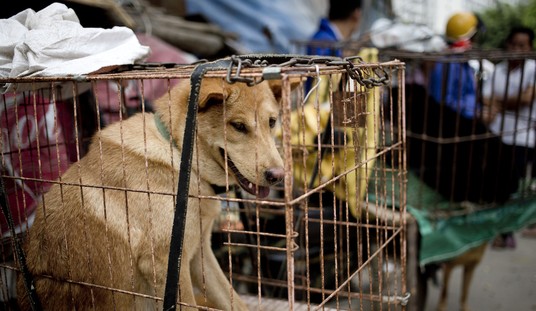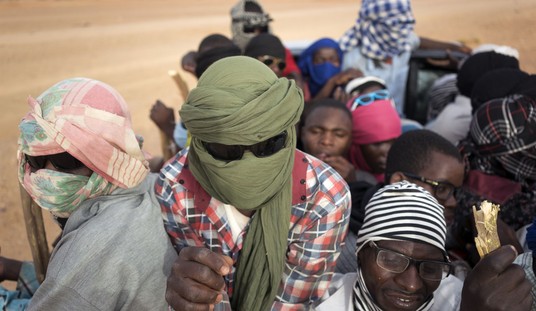Europe faces some very real problems, some of the most serious trouble, in fact, that the continent has faced since 1945. Most of the nations of Europe are facing a major demographic crisis; Europeans simply aren't having babies. Parts of major cities from Madrid to Paris to Copenhagen have been taken over by the waves of unchecked immigrants from the Middle East and North Africa, turning whole neighborhoods into no-go zones where a millennium or more of European law has been replaced by Sharia law.
But there's a new right arising in Europe, and if Europe is to see a second Renaissance, it will come from these politicians. One of those politicians is Italy's Prime Minister, Giorgia Meloni; a staunch partisan of what's best for Italy and the Italian people, a European ally of the Trump administration, and an effective liaison between the Old and New Worlds.
If there's hope for Europe, Giorgia Meloni represents that hope.
Italy’s prime minister Giorgia Meloni is strengthening her position as a key political leader in Europe, acting as a link between the EU and the United States at a time when old power structures are weakening. The summit held Sunday, May 18, at Palazzo Chigi—with Meloni, European Commission president Ursula von der Leyen, and U.S. vice president JD Vance—showcased Italy’s new role on the world stage: that of a serious, credible mediator.
The meeting, organized after weeks of high-level diplomatic contacts, focused on the state of transatlantic relations, tariff disputes, and global challenges in security and stability.
During the opening press conference, Meloni made Italy’s intended role clear: “A month ago, I proposed this meeting in Washington. I am proud to welcome two key leaders to start a new dialogue between our nations. There are matters that fall directly under the competence of the European Commission, but Italy wants to help build bridges.” Her words sketched a political vision that reaches beyond Italy and aims to reshape the West from a Mediterranean perspective.
Signora Meloni is clearly of the "Make Italy Great Again" (l'Italia di Nuovo Grande) mold, and her alliances with both the Trump 45 and Trump 47 administrations are well-known; she shows every appearance of viewing President Trump not only as a political ally but as a personal ally as well, and that assessment appears to extend to Vice President Vance as well. While the VP was in Rome for the investiture of the new pope, Signora Meloni met with him and the European Commission President, Ursula von der Leyen, and poured some oil on the troubled waters:
JD Vance, for his part, praised the Italian premier, calling her “a good friend” and thanking her for her willingness to “build bridges between the U.S. and Europe.” He emphasized the need to overcome trade tensions while keeping shared values in mind. Ursula von der Leyen also publicly acknowledged Meloni’s facilitating role, highlighting that “the trade between our regions is the most prosperous in the world, and we need agreements that benefit both sides.”
Thanks in part to Meloni's leadership, Italy is emerging as a greater influence in Europe, even as the traditional leaders of Europe - France, Germany, and the United Kingdom - are struggling to overcome economic and demographic issues. That's an interesting twist in history, as it was the Roman Republic that was one of the founders of the Western civilization that we enjoy the benefits of today.
All signs point to Meloni recognising the current shift in global politics. As German leadership fades, France grows weaker, and Brussels drifts from national concerns, a leadership vacuum has opened—and Meloni is ready to step in. Without direct confrontation, but with resolute clarity, Meloni has positioned herself as a viable alternative to EU orthodoxy: a Europe of sovereign nations that cooperate freely, rooted in identity and tradition, capable of speaking with one voice to Washington or Beijing.
"Identity and tradition" are some of the major problems Europe faces. Here's the thing: A nation can overcome economic troubles. The nations of Europe have done so before; the continent was largely wrecked in 1945 but managed to bounce back from that, with the help of the Marshall Plan and a lot of American cash. But a crisis of identity and tradition, that's a different story; if Europe goes too far down this road, there's no coming back.
There are troubling signs of this already. There are over 40 "no-go" areas in Amsterdam. There are areas in Berlin where Jews and gay people are advised to avoid, and Berlin's Green Party has advocated for women-only Strassebahn cars to protect German women from harassment. Parts of London are "no-go" zones for Jews. And one Budapest think tank, the Migration Research Institute, estimates there are 900 "no-go" areas in Europe.
At least one German police official has been speaking out about this disturbing trend:
Police union chairman Rainer Wendt told Spiegel: “In the north of Duisburg, there are neighborhoods where colleagues can barely stop a car, they will be surrounded by 40 or 50 men.”
Wendt, president of Europe’s largest police union, also said: “We are facing a challenge that is unprecedented in post-war history.” The risk of collapse is “very real,” Wendt warned, and the police are losing control of the situation. “Radical Islamists are questioning the power on our streets. If no action is taken, Sharia law will prevail instead of the constitution. It is time to return to the fundamental values of our societies. Otherwise, the country will collapse and the law of the strongest will prevail.”
Too many of the various nations of Europe seem to be hoping the crocodile eats them last, not stopping to think that they will all be eaten in the end.
See Also: Coming Soon to a Mosque Near You: Italian Catholic Kids Taught Muslim Prayers on School Outing
President Trump Welcomes Italy's PM Meloni to the White House - and Has Some Remarks About China
Europe is a land of great historical importance. Europe, beginning with Greece and Rome and continuing through the nations of the Anglosphere, is the wellspring of Western civilization. It is Western civilization that has lifted more people out of poverty and ignorance than any other organizing force in the world. It is Western civilization that led the way to erasing the blight of slavery from most of the civilized world. It is Western civilization that spread literacy, sanitation, and representative government around the world.
It would be a calamity if Europe fell into savagery, and yet, in places in Europe, that's already happening. If the nations of Europe can recover from this, it will be leaders like Giorgia Meloni who show them the way.














